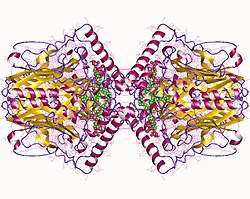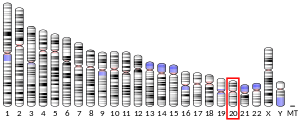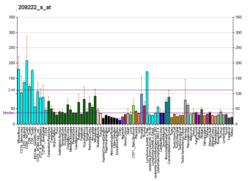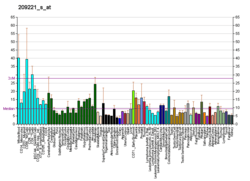OSBPL2
Oxysterol-binding protein-related protein 2 is a protein that in humans is encoded by the OSBPL2 gene.[5][6][7]
| OSBPL2 | |||||||||||||||||||||||||
|---|---|---|---|---|---|---|---|---|---|---|---|---|---|---|---|---|---|---|---|---|---|---|---|---|---|
 | |||||||||||||||||||||||||
| Identifiers | |||||||||||||||||||||||||
| Aliases | OSBPL2, ORP-2, ORP2, DFNA67, DNFA67, oxysterol binding protein like 2 | ||||||||||||||||||||||||
| External IDs | OMIM: 606731 MGI: 2442832 HomoloGene: 77324 GeneCards: OSBPL2 | ||||||||||||||||||||||||
| |||||||||||||||||||||||||
| |||||||||||||||||||||||||
| |||||||||||||||||||||||||
| |||||||||||||||||||||||||
| Orthologs | |||||||||||||||||||||||||
| Species | Human | Mouse | |||||||||||||||||||||||
| Entrez | |||||||||||||||||||||||||
| Ensembl | |||||||||||||||||||||||||
| UniProt | |||||||||||||||||||||||||
| RefSeq (mRNA) | |||||||||||||||||||||||||
| RefSeq (protein) | |||||||||||||||||||||||||
| Location (UCSC) | Chr 20: 62.23 – 62.3 Mb | Chr 2: 180.12 – 180.16 Mb | |||||||||||||||||||||||
| PubMed search | [3] | [4] | |||||||||||||||||||||||
| Wikidata | |||||||||||||||||||||||||
| |||||||||||||||||||||||||
This gene encodes a member of the oxysterol-binding protein (OSBP) family, a group of intracellular lipid receptors. Most members contain an N-terminal pleckstrin homology domain and a highly conserved C-terminal OSBP-like sterol-binding domain, although some members contain only the sterol-binding domain. This encoded protein contains only the sterol-binding domain. In vitro studies have shown that the encoded protein can bind strongly to phosphatic acid and weakly to phosphatidylinositol 3-phosphate, but cannot bind to 25-hydroxycholesterol. The protein associates with the Golgi apparatus. Transcript variants encoding different isoforms have been described.[7]
References
- GRCh38: Ensembl release 89: ENSG00000130703 - Ensembl, May 2017
- GRCm38: Ensembl release 89: ENSMUSG00000039050 - Ensembl, May 2017
- "Human PubMed Reference:". National Center for Biotechnology Information, U.S. National Library of Medicine.
- "Mouse PubMed Reference:". National Center for Biotechnology Information, U.S. National Library of Medicine.
- Laitinen S, Olkkonen VM, Ehnholm C, Ikonen E (Feb 2000). "Family of human oxysterol binding protein (OSBP) homologues. A novel member implicated in brain sterol metabolism". J Lipid Res. 40 (12): 2204–11. PMID 10588946.
- Laitinen S, Lehto M, Lehtonen S, Hyvarinen K, Heino S, Lehtonen E, Ehnholm C, Ikonen E, Olkkonen VM (Feb 2002). "ORP2, a homolog of oxysterol binding protein, regulates cellular cholesterol metabolism". J Lipid Res. 43 (2): 245–55. PMID 11861666.
- "Entrez Gene: OSBPL2 oxysterol binding protein-like 2".
Further reading
- Nagase T, Ishikawa K, Suyama M, et al. (1999). "Prediction of the coding sequences of unidentified human genes. XI. The complete sequences of 100 new cDNA clones from brain which code for large proteins in vitro". DNA Res. 5 (5): 277–86. doi:10.1093/dnares/5.5.277. PMID 9872452.
- Xu Y, Liu Y, Ridgway ND, McMaster CR (2001). "Novel members of the human oxysterol-binding protein family bind phospholipids and regulate vesicle transport". J. Biol. Chem. 276 (21): 18407–14. doi:10.1074/jbc.M101204200. PMID 11279184.
- Lehto M, Laitinen S, Chinetti G, et al. (2001). "The OSBP-related protein family in humans". J. Lipid Res. 42 (8): 1203–13. PMID 11483621.
- Jaworski CJ, Moreira E, Li A, et al. (2002). "A family of 12 human genes containing oxysterol-binding domains" (PDF). Genomics. 78 (3): 185–96. doi:10.1006/geno.2001.6663. PMID 11735225.
- Deloukas P, Matthews LH, Ashurst J, et al. (2002). "The DNA sequence and comparative analysis of human chromosome 20". Nature. 414 (6866): 865–71. doi:10.1038/414865a. PMID 11780052.
- Strausberg RL, Feingold EA, Grouse LH, et al. (2003). "Generation and initial analysis of more than 15,000 full-length human and mouse cDNA sequences". Proc. Natl. Acad. Sci. U.S.A. 99 (26): 16899–903. doi:10.1073/pnas.242603899. PMC 139241. PMID 12477932.
- Gerhard DS, Wagner L, Feingold EA, et al. (2004). "The status, quality, and expansion of the NIH full-length cDNA project: the Mammalian Gene Collection (MGC)". Genome Res. 14 (10B): 2121–7. doi:10.1101/gr.2596504. PMC 528928. PMID 15489334.





